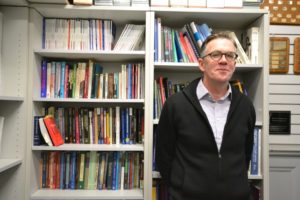Know Your Profs is an ongoing series of profiles on the instructors at Camosun College. Every issue we ask a different instructor at Camosun the same 10 questions in an attempt to get to know them a little better.
If you have an instructor you’d like to see interviewed in the paper, but perhaps you’re too busy, or too shy, to ask them yourself, email editor@nexusnewspaper.com and we’ll add them to our list of teachers to talk to.
This issue we caught up with Criminal Justice prof Ray Lonsdale to talk about being a seasonal instructor, loving the ’80s, and the involvement of corporations in the future of post-secondary.

1. What do you teach and how long have you been at Camosun?
I’ve been at Camosun for eight years now. I teach in the Criminal Justice department. I’m a sessional instructor, usually instructing one course per semester. I have a full-time job as a crime analyst with the Victoria Police Department.
2. What do you personally get out of teaching?
Simply… joy and excitement. Criminal justice is a social science, so it’s about applying knowledge to understand the world around us and then using that applied knowledge to effect change. So, personally, I get great joy out of watching students transform from not knowing to understanding, and not because they have the correct answer but because they asked questions. I’m also excited to see our students become tomorrow’s thinkers and problem solvers.
3. What’s one thing you wish your students knew about you?
I am constantly watching, reading, and listening, wondering how I can incorporate what I just saw, read, or heard into one of my lectures. Learning for me is an everyday thing. I’m never satisfied with saying “I don’t know.” If I don’t know, I take that statement as my first step to go find out. If I’m driving or riding my bike, I’m usually doing one of three things: wondering how or where some drivers got their licence, singing to ’80s new wave, or thinking about an issue and debating both sides… always out loud.
4. What is the one thing you wish they didn’t know about you?
Well, I’m not really around the college a lot, so many students don’t know me all that well. But if I had to pick one thing I would say it was that I love the ’80s.
5. What is the best thing that’s happened to you as a teacher here?
Other than the engagement with students on ideas, I would say—pardon me if this is cliché—it’s been, and continues to be, getting to know the people I teach with in the Criminal Justice faculty. We chat, we laugh, and we discuss ideas. After a week of hearing and analyzing the five percent of the bad within a community, coming to Camosun and seeing fellow instructors and interested students is awesome.
6. What is the worst thing that’s happened to you as a teacher here?
As a sessional instructor I am not affected by much. But, in general, I would say decisions based on systems and quantification rather than people and policy.
7. What do you see in the future of post-secondary education?
I see it to be under continuous attack, directly or indirectly, through governments, from corporations and consultancy firms wanting job applicants—automatons—who know systems and procedures, rather than individuals and citizens who can learn and think critically and creatively. If we don’t stop this ever-increasing and gaining-momentum move toward a corporatist and managerial model, we will end up with a system beyond financial and creative reach for all of our citizens. Our colleges and universities were set up to be public institutions—see Public University Bill of 1849—and were designed to graduate conscious citizens free to examine their life, free to ask questions, and free to doubt so as to make the world we live in that much better. Our public education system should be pushing ethics, the advancement of ideas, and the move toward a greater egalitarian idea of ourselves, accepting of all cultures, languages, and people. Instead, we find ourselves fighting ideologues and talking about debt, accepting budget cuts, and forcing fundraising. A post-secondary educational system should be excited about promoting the next wave of leaders, teachers, artists, scientists, thinkers, and entrepreneurs to Canada and the world rather than producing the next wave of debtors struggling more to pay their loans than to change the world.
8. What do you do to relax on weekends?
Well, I would like to say I get a large bag of sour cream and onion chips and a glass of red wine and watch the Toronto Maple Leafs on Hockey Night in Canada, but that usually starts and ends with stress, so I’ll say in the colder months I ride my mountain bike or snowboard. In the summer, I ride my road bike or play golf. My wife and I will take our dog for walks in and around the Greater Victoria area, and then I usually end my day with a book at a local coffee shop.
9. What is your favourite meal?
Anything with noodles and sauce and a glass of wine; it is a large glass.
10. What is your biggest pet peeve?
Hypocrisy.
